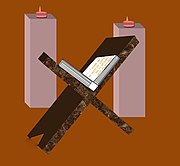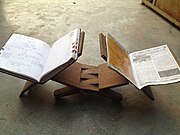Rehal (book rest)
This article needs additional citations for verification. (February 2020) |

A rehal[a] (Urdu: رِحال; Arabic: رَحْل; Turkish: rahle) or tawla (Arabic: طاولة), also called a "Qur'an stand" by English-speaking Muslims, is an X-shaped, foldable book rest or lectern used for placing holy books during recitation. It is designed to collapse into a flat form for portability and storage when not in use. This book rest, which is usually made of wood, but also increasingly made of other materials such as plastic, is commonly used by Muslims, Hindus, and Sikhs. Used historically for many generations in South Asian and Arab countries, it is used both to hold and ensure respect for holy books (such as the Qur'an in Islam, Ramayana in Hinduism, and Japji Sahib in Sikhism) by keeping them elevated off the floor.[1][better source needed]
Etymology[]
The name "rehal" ultimately derives from the Arabic word rahl (رَحْل) meaning "camel saddle", referring to the resemblance of the unfolded lectern to a saddle.[2]
History[]
For centuries folding lecterns have served throughout the Islamic world as supports for large Qur’an books used during recitations. They were among the most valuable furnishings of every mosque and were decorated using a variety of techniques, including calligraphy and abstract floral arabesque motifs. Secondary literature maintains that the form of these lecterns had been derived from folding chairs such as those that had already been used in ancient Egypt.[3]
Gallery[]

Qur'an and rehal

Depiction of a rehal, with the Ramayana placed on it

Qur'an placed on a rehal at the Abuja National Mosque, Nigeria

An unusual double rehal, in this case used for studying
Notes[]
- ^ Also variously romanised from Urdu as rayhal or rihal and from Arabic as rahla or rahil.
References[]
- ^ "Extra Large Wooden Quran Stand". Islamicbookstore.com. Retrieved 2014-02-11.
- ^ Tenerowicz, Eleonora. "Składany pulpit pod Koran". etnomuzeum.eu (in Polish). Ethnographic Museum of Krakow. Archived from the original on 24 January 2021.
- ^ "Qur'an stand | Discover Islamic Art | Virtual Museum". islamicart.museumwnf.org. Museum with No Frontiers. Archived from the original on 25 July 2021.
- Hindu culture
- Islamic culture
- Sikh culture
- Religious furniture
- Islamic terminology
- Hinduism stubs
- Sikhism stubs



